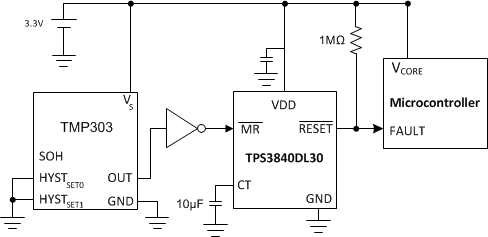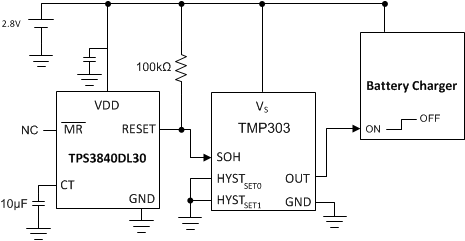ZHCSJ38C December 2018 – August 2019 TPS3840
PRODUCTION DATA.
- 1 特性
- 2 应用
- 3 说明
- 4 修订历史记录
- 5 Device Comparison Table
- 6 Pin Configuration and Functions
- 7 Specifications
- 8 Detailed Description
-
9 Application and Implementation
- 9.1 Application Information
- 9.2 Typical Application
- 10Power Supply Recommendations
- 11Layout
- 12器件和文档支持
- 13机械、封装和可订购信息
9.2.2 Design 2: Battery Voltage and Temperature Monitor
A typical application for the TPS3840 is battery voltage and temperature monitoring. The TPS3840 is offered in active-low or active-high output topologies and can operate above or below the voltage threshold meaning the device can be used as an undervoltage monitor as shown in Figure 49 or overvoltage monitor as shown in Figure 50. The TPS3840 can be used to monitor any rail above 1.6 V. In this design application, one TPS3840DL30 monitors the 3.3-V battery voltage rail and triggers an active-low reset fault condition if the battery voltage falls below the 3-V threshold. For overvoltage monitoring, another TPS3840DL30 monitors a 2.8-V battery and triggers a logic high at the 3-V threshold plus 100 mV hysteresis so at 3.1 V. Both applications monitor the battery temperature using TMP303, a push-pull, active-high temperature switch. A temperature fault is triggered if the battery temperature falls outside of a defined window temperature range set by the TMP303 variant chosen.
 Figure 49. Low Battery Voltage and Window Temperature Monitoring Solution
Figure 49. Low Battery Voltage and Window Temperature Monitoring Solution  Figure 50. Overvoltage and Window Temperature Monitoring Solution
Figure 50. Overvoltage and Window Temperature Monitoring Solution